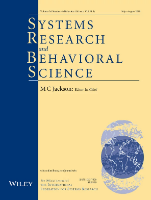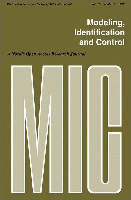
SYSTEMS RESEARCH AND BEHAVIORAL SCIENCE
Scope & Guideline
Bridging disciplines to illuminate complex systems.
Introduction
Aims and Scopes
- Interdisciplinary Systems Thinking:
The journal emphasizes the integration of systems thinking across various fields including management, education, health, and environmental studies, promoting a holistic understanding of complex problems. - Complexity and Dynamic Systems:
Research often explores the dynamics of complex systems, including feedback loops, emergent behaviors, and non-linear interactions, providing insights into how systems evolve over time. - Innovative Applications of Systems Methodologies:
The journal features studies that apply different systems methodologies such as system dynamics, soft systems methodology, and critical systems thinking to real-world problems, enhancing practical implications. - Focus on Sustainability and Resilience:
A significant portion of the research addresses sustainability issues, examining how systems thinking can contribute to resilience in social, economic, and environmental contexts. - Behavioral Insights within Systems Frameworks:
The journal incorporates behavioral science perspectives to understand how individual and collective behaviors affect system dynamics, thereby enriching the analysis of systemic issues.
Trending and Emerging
- Artificial Intelligence and Systems Thinking:
Recent publications have focused on the intersection of AI and systems thinking, exploring how AI can enhance decision-making processes and systems management across various sectors. - Sustainability and Climate Change:
There is a growing emphasis on sustainability research, particularly in relation to climate change, with studies examining systemic approaches to environmental policy and organizational resilience. - Participatory Systems Approaches:
The trend towards participatory methodologies is evident, with research advocating for stakeholder engagement and co-creation in the design and implementation of systems interventions. - Health Systems and Pandemic Responses:
The COVID-19 pandemic has catalyzed research related to health systems, focusing on resilience, adaptability, and the integration of systems thinking in public health strategies. - Complex Adaptive Systems:
An increasing number of studies are adopting the lens of complex adaptive systems to analyze social phenomena, recognizing the fluidity and interconnectedness of societal challenges.
Declining or Waning
- Traditional Organizational Theories:
There has been a noticeable decrease in papers focusing on classical organizational theories without a systems perspective, as the field increasingly adopts more dynamic and integrative approaches. - Static Systems Models:
Research that relies on static models without considering the dynamic interactions and feedback mechanisms present in complex systems is becoming less common, as scholars favor more adaptive methodologies. - Narrowly Defined Case Studies:
Studies that focus solely on narrow case analyses without broader implications for systems thinking are declining, as the journal encourages research that contributes to generalizable frameworks and theories. - Disciplinary Isolation:
There is a diminishing focus on research that does not engage with interdisciplinary approaches, as the journal promotes a collaborative ethos that transcends traditional disciplinary boundaries. - Overly Theoretical Discussions:
While theoretical contributions remain important, there is a trend away from overly abstract discussions that do not provide practical applications or empirical validation within systems research.
Similar Journals

Interdisciplinary Studies of Complex Systems
Exploring the Intricacies of Interdisciplinary ConnectionsInterdisciplinary Studies of Complex Systems, published by DRAGOMANOV NATIONAL PEDAGOGICAL UNIVERSITY, is a pioneering journal dedicated to advancing the understanding of complex systems through an interdisciplinary lens. With the ISSN 2307-4515, this journal serves as a vital resource for researchers, professionals, and students who are engaged in the dynamic interplay of various fields including mathematics, sociology, biology, and artificial intelligence. Although currently designated as a non-open access journal, it aims to provide high-quality, peer-reviewed articles exploring the intricacies of system interactions and behaviors, facilitating constructive dialogue across disciplines. As the field of complex systems continues to evolve, this journal stands out as a key platform for disseminating innovative research and fostering collaborations that bridge theoretical frameworks and practical applications, contributing significantly to shaping future academic and professional landscapes.

SYSTEMIC PRACTICE AND ACTION RESEARCH
Shaping the future of management through rigorous inquiry.SYSTEMIC PRACTICE AND ACTION RESEARCH is a premier journal published by Springer/Plenum Publishers, dedicated to advancing knowledge and methodologies within the fields of systemic practice and action research. With a strong focus on the interplay between technology and management, the journal serves as a vital platform for scholars and professionals to share pioneering research and insights from 1996 through to 2024. Indexed by Scopus and recognized in the Q3 quartile for the management categories in both Technology and Innovation, as well as Strategy and Management, the journal showcases rigorous empirical studies and theoretical frameworks that shape contemporary discourse. Offering open access to its contents, SYSTEMIC PRACTICE AND ACTION RESEARCH ensures that vital research findings are widely disseminated, fostering collaboration and innovation among researchers, professionals, and students alike. Situated in the heart of New York, the journal reflects the dynamic nature of the field and remains committed to enriching the landscape of management and systemic inquiry.

Journal of the Royal Society Interface
Fostering Collaboration, Advancing Scientific FrontiersJournal of the Royal Society Interface is a premier interdisciplinary journal dedicated to the convergence of life sciences, physical sciences, and engineering. Published by the esteemed Royal Society in the United Kingdom, this journal serves as a dynamic platform for innovative research that pushes the boundaries of both fundamental and applied science. With a significant impact factor and ranked in the prestigious Q1 category across multiple domains, including Biochemistry, Bioengineering, and Biomedical Engineering, the journal consistently prioritizes high-quality contributions that innovate and inspire. Accessible to researchers, professionals, and students alike, it aims to cultivate a deeper understanding of complex interactions and synergies among biological and physical systems. From its inception in 2004 to its evolving knowledge contributions through 2024, the Journal of the Royal Society Interface plays a pivotal role in shaping future research directions and fostering collaboration across scientific domains.

Health Systems
Fostering interdisciplinary dialogues in health systems.Health Systems is a vital journal dedicated to advancing the understanding and application of health system dynamics, innovations, and policies. Published by Taylor & Francis Ltd, this journal has established a reputation as a significant contributor in the fields encompassing Computer Science Applications, Health Informatics, and Health Policy, among others. With a Q3 category ranking in various relevant disciplines and notable percentile rankings in health policy and management sciences, Health Systems serves as a robust platform for researchers and practitioners to publish their findings and foster interdisciplinary dialogues. The journal attracts a diverse audience committed to improving health systems through empirical research and theoretical developments. It continuously evolves, reflecting contemporary challenges and innovations from 2012 to 2024, making it an indispensable resource for those invested in the future of healthcare.

BIOLOGICAL CYBERNETICS
Pioneering Research in Biological CyberneticsBIOLOGICAL CYBERNETICS is a premier journal published by SPRINGER, dedicated to advancing the fields of biotechnology and computer science through the lens of biological interactions. With an ISSN of 0340-1200 and an E-ISSN of 1432-0770, this esteemed journal has been a cornerstone of academic research since its inception in 1961 and is set to continue influencing the landscape of biological cybernetics through 2024. The journal currently holds a Q3 ranking in the Biotechnology category and a Q2 ranking in miscellaneous Computer Science according to the 2023 category quartiles, showcasing its credibility and impact in the interdisciplinary nexus of these fields. Although it does not provide open access options, researchers and students can engage with its innovative content that includes original research articles, reviews, and methodologies that explore the computational modeling of biological systems and the integration of artificial intelligence in biological research. With its strategic location in the United States and a robust publication record, BIOLOGICAL CYBERNETICS remains an essential resource for anyone looking to deepen their understanding and application of cybernetic principles within biological contexts.

Journal of Systems Science and Systems Engineering
Exploring the dynamics of control and information systems.Journal of Systems Science and Systems Engineering is a prestigious academic journal aimed at fostering discourse and research in the interdisciplinary fields of Control and Systems Engineering and Information Systems. Published by SPRINGER HEIDELBERG in Germany, this journal is dedicated to advancing the understanding of complex systems through innovative methodologies and comprehensive theoretical frameworks. With its Q3 quartile rankings in both fields for 2023, it reflects a growing influence in the academic community, as evidenced by its Scopus rankings, which place it in the 45th and 40th percentiles, respectively. The journal encourages both empirical and theoretical contributions, making it a valuable resource for researchers, professionals, and students passionate about system science. Although it does not offer open access, the journal's commitment to rigorous peer review ensures high-quality, impactful research that contributes significantly to the scientific advancements in these domains.

MODELING IDENTIFICATION AND CONTROL
Connecting Theory with Practice in Engineering ExcellenceMODELING IDENTIFICATION AND CONTROL is a prominent academic journal dedicated to the fields of Computer Science Applications, Control and Systems Engineering, Modeling and Simulation, and Software. Published by MIC in Norway, this open access journal has been providing valuable insights and innovative research since 1980, promoting the free dissemination of knowledge. With a reputation reflected in its 2023 quartile rankings—Q3 in Computer Science Applications, Q2 in Control and Systems Engineering, and Modeling and Simulation, as well as Q3 in Software—this journal plays a vital role in advancing theoretical and practical solutions within its disciplines. Researchers and professionals benefit from its rigorous peer-review process and impactful publications, fostering collaboration and the exploration of emerging technologies across various applications. The journal's continual commitment to excellence is exemplified by its active presence in Scopus, where it maintains respectable rankings in relevant engineering and computer science subcategories, supporting its goal to be a pivotal resource for scholarly communication and practical advancements.

BEHAVIORAL AND BRAIN SCIENCES
Exploring the Nexus of Mind and BehaviorBehavioral and Brain Sciences, published by Cambridge University Press, is a pivotal journal focusing on the interdisciplinary fields of Behavioral Neuroscience, Neuropsychology, and Physiological Psychology. With a history dating back to 1978 and ongoing through 2024, this journal serves as a vital platform for researchers, professionals, and students seeking to advance their understanding of brain-behavior relationships. Despite its current Q3 classification in various categories as of 2023, Behavioral and Brain Sciences is recognized for its insightful articles that foster discussions among professionals in the field. While it operates on a subscription model, the journal ensures broad access through individual and institutional subscriptions. Researchers will find this journal not only valuable for publishing their work but also for accessing a diverse range of scholarly articles that address contemporary issues in neuroscience and psychology, thereby enhancing the academic discourse within these evolving fields.

KYBERNETES
Exploring the Frontiers of Artificial Intelligence and Systems EngineeringKYBERNETES is a leading peer-reviewed journal published by Emerald Group Publishing Ltd, focusing on the interdisciplinary fields of Artificial Intelligence, Computer Science, Control and Systems Engineering, and related domains. Since its inception in 1972, KYBERNETES has established itself as a vital resource for researchers and practitioners, offering insights into the theoretical and practical aspects of cybernetics and its applications. With a notable impact factor reflected in its impressive Q1 and Q2 rankings across various categories, including Social Sciences and Electrical and Electronic Engineering, the journal is recognized for its contribution to advancing knowledge and fostering innovation within these fields. KYBERNETES appeals to a diverse audience, ranging from seasoned professionals to budding students, providing a rich platform for disseminating high-quality research and practical findings. While the journal is not open access, it offers comprehensive subscription options, ensuring that critical information is accessible to those engaged in these rapidly evolving disciplines.

JOURNAL OF STATISTICAL MECHANICS-THEORY AND EXPERIMENT
Fostering Knowledge in Statistical Mechanics and Its ApplicationsJOURNAL OF STATISTICAL MECHANICS-THEORY AND EXPERIMENT is a prominent academic journal published by IOP Publishing Ltd in the United Kingdom, focusing on the interdisciplinary realms of statistical mechanics and its applications across both theory and experimental research. Since its inception in 2004, the journal has consistently served as a crucial platform for researchers and professionals in statistical and nonlinear physics, as well as statistics and probability. With its strong Scopus ranking in the 87th percentile for Mathematics and 78th percentile in Physics and Astronomy, JOURNAL OF STATISTICAL MECHANICS provides high-impact content that promotes innovative research and the latest advancements in the field. Although currently not an open-access journal, it supports a wide readership through its strategic focus on rigorous peer-reviewed studies. Researchers, professionals, and students pursuing excellence in statistical mechanics will find this journal an invaluable resource for the dissemination of impactful findings and theoretical explorations.